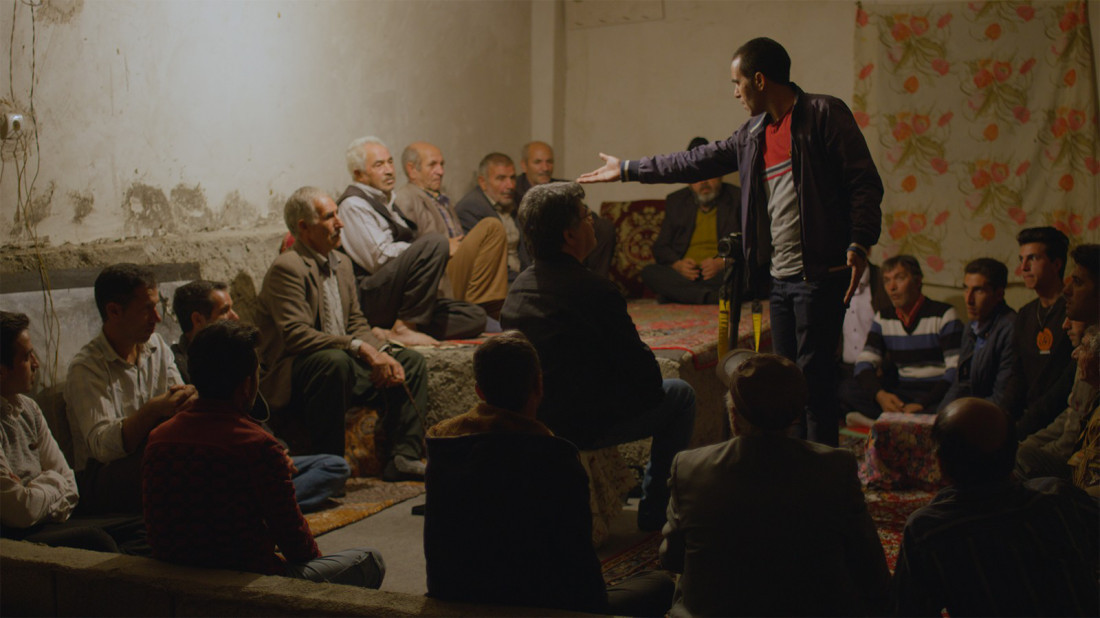No Bears
★★★ out of 5
Plays at Cinematheque from Feb. 4 to 12.
Another week, another Toronto International Film Festival pick playing at the local (and now only) downtown cinema. Iranian auteur and political dissident Jafar Panahi directs, produces and writes his eleventh feature film, No Bears.
Here is a solemn, understated motion picture that is perhaps a bit too insular for its own good. Unassuming but not insubstantial, the narrative itself is somewhat complex, with multiple story threads woven together and a healthy dose of meta commentary throughout.
No Bears stars Panahi in the main role as – himself. In it, a fictionalized version of Panahi remotely directs a film produced on the other side of the Iran-Turkey border, which he is prohibited from crossing. He’s embroiled in a local controversy over forbidden love and long-standing provincial traditions in his village.
The fear and loathing among Iranian people and the unrest that permeates quotidian life is evident throughout the film. Most notably, Panahi’s film-withina-film’s resemblance to the actual plight of Iranians attempting to escape causes the actors to break character and become emotional. The film never explicitly states why the cast and crew seem to be on the government’s shit list. But Iranian filmmakers have been important figures of dissent since the country’s repressive regime took power in 1979.
Filmmakers like Panahi, Abbas Kiarostami and Mohsen Makhmalbaf pushed back against government-imposed censorship through movies that play with cinematic form and blur the lines between documentary and fiction. That subversion brought the state’s ire on Panahi in 2010, when he was placed under house arrest and banned from making films for 20 years. He’s made six films since, in secret, clandestinely smuggled out of the country under the government’s nose.
This is about as spartan as filmmaking gets, perhaps to reflect the arduous conditions in which Panahi works. In July, the Iranian government arrested Panahi prior to the film’s premiere and sentenced him to six years in prison on gossamer charges of political dissidence.
In a way, the intimacy of the film can be ironically alienating. As autobiography, it’s compelling, but as cinema, it can feel disconnected.
When Zara (Mina Kavani) looks into the camera and brazenly cuts her scene short to vent her real-life frustrations to Panahi (an obvious surrogate for the viewer), viewers may feel the emotion, but the gravity of the situation is lost without context.
Muddling the line between fiction and reality creates a certain distance between the events depicted onscreen and the viewer’s emotional investment in the plot. Coupled with lackadaisical pacing, the film stands to be somewhat of a grind during its 107-minute runtime.
The juxtaposition of the romantic plotlines, as touted by the film’s official synopsis, is relatively minor in the grand scheme but nonetheless sheds light on the movie’s themes. Zara and Bakhtiar (Bakhtiar Panjei) seek to escape Iran by acquiring fake passports, like in Casablanca. Conversely, Panahi inadvertently involves himself in a love triangle marred by unromantic obligation in the form of arranged marriage.
On the big screen, at least, tragedy is noble. In real life, it breaks the spirit. The title of the film, as suggested by a minor character, is an allegory for the continual fear and dread the characters face. Perhaps there are no bears waiting in the darkness, but there is only one way to find out, as corroborated by the film’s dramatic conclusion.
Like a lot of well-made foreign films, I appreciate and admire the craft here more than wholly enjoy it. This is a vivid snapshot into the plight of the Iranian artist but a tad esoteric for those such as I with limited understanding of the politics and social conventions inextricable from the basics of the picture. Panahi easily achieves empathy here. Genuine engagement, less so.
Published in Volume 77, Number 17 of The Uniter (February 2, 2023)








